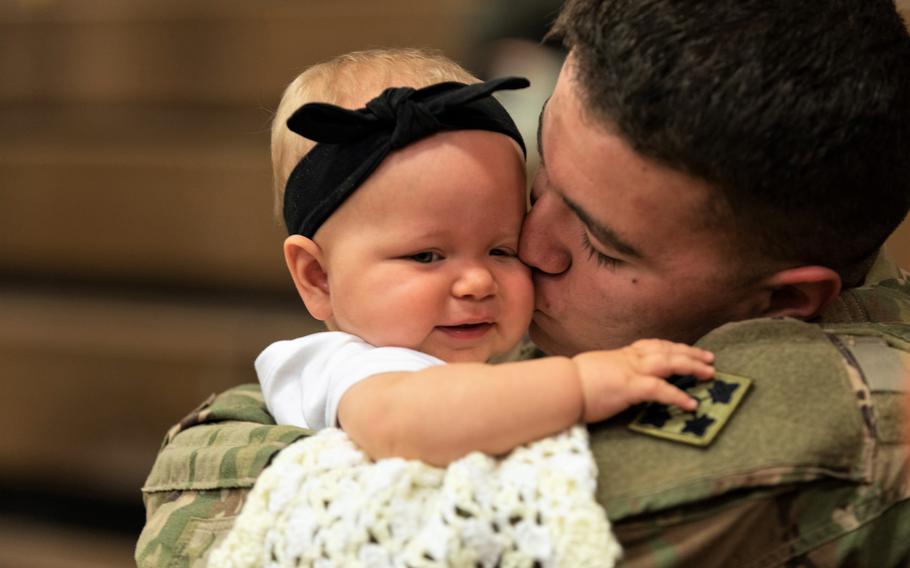
Army Spc. Dallas Ochoa, assigned to the 2nd Infantry Brigade Combat Team, 4th Infantry Division, reunites with his daughter, Kaylynn, following a homecoming ceremony at Fort Carson, Colo., in 2018. (Micah Merrill/U.S. Army)
The Army on Tuesday expanded its Congress-mandated parental leave policy, granting 12 weeks of leave after welcoming a new child to all soldiers regardless of gender.
The Army was the last of the military services to implement the new policy in recent weeks, after the Defense Department rolled out its guidelines Jan. 4. Congress in the 2022 National Defense Authorization Act, which sets its annual priorities for the Pentagon, had mandated the armed forces adopt a 12-week parental leave policy by Jan. 1 — a target all the services missed.
Like the other services, however, the Army backdated its policy to cover soldiers who have welcomed a new child or had unused parental leave as of Dec. 27. The Marine Corps rolled out its new policy on Monday, and the Navy unveiled its on Jan. 19. The Air Force, Space Force and Coast Guard announced their new parental leave policies on Jan. 5.
In a Twitter statement, Army Secretary Christine Wormuth wrote Tuesday that she was excited to roll out the new policy, which defense officials believe could bolster morale among military parents.
“The [Army] recruits soldiers, but retains families,” she tweeted.
The Army policy instructs commanders to authorize new mothers and fathers the full 12 weeks of leave after the birth of their child, an adoption or the placement of a minor child for long-term foster care, according to guidelines published by Army Human Resources Command. The policy replaces the Army’s most recent parental leave policy that granted six weeks of maternity leave to birth mothers and three weeks of leave to secondary caregivers, such as fathers or other non-birth partners.
For birth parents, the 12-week parental leave period would follow convalescent leave to recover from childbirth ordered by a doctor, according to HRC.
The Army’s policy largely mirrors those unveiled by the other military services, including the Marines’ policy. While Marine officials said their policy was delayed until after the Navy could publish its new policy, Army officials did not immediately explain the reason for its delay.
The Army’s policy does have one significant difference from those rolled out by the other services. The other services’ policies — including the Marines’ — largely allowed commanders to deny leave under certain circumstances, though the Army policy allows “only the first general officer in a soldier’s chain of command” to disapprove a parental leave request, according to the service.
Human Resources Command wrote parental leave should only be denied for significant events that would impact a unit’s combat readiness, such as a “critical deployment” or a “critical training event.” It wrote soldiers denied parental leave must later be granted that leave. Soldiers have up to one year after birth or adoption to use their 12 weeks of leave, which can be taken in a single block or in shorter increments, according to the policy.
Sgt. Maj. of the Army Michael Grinston, the service’s top enlisted soldier, tweeted Tuesday that soldiers should work with their chains of command early to develop their parental leave plans to ensure it “balances both the needs of the soldier and the needs of the unit.
“Work with your leaders to communicate your intent and plan as early as possible,” Grinston wrote. “This should not impact [combat] readiness if we prepare.”